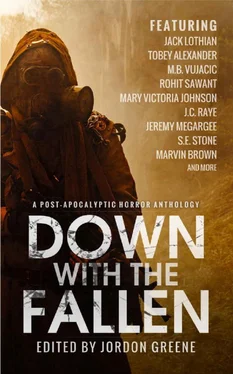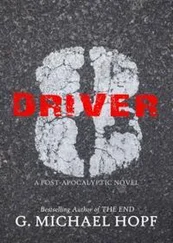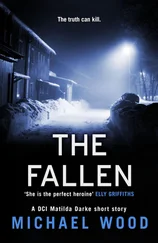It’s a dark day. Black clouds swallow the heath’s endless skies, and wind races unchallenged across the spread of heather. The Dust dances with the imminent weather, forming ephemeral shapes: a crucifix; a ball of unspooling yarn; a human, with the skewered proportion of a child’s drawing.
As Jack watches, the last form doesn’t evaporate with the wind. The hair on the back of her neck prickles. She has the feeling the not-human is watching her, too.
Thunder rumbles, and the form vanishes.
Jack blames the faulty gasmask. She’s inhaled too much Dust.
Down in the valleys, the air is cleaner. The ferns and sparse trees are less warped than the plants on the hills, and the tadpoles, water skippers, and newts continue to display almost natural behavior in the ponds. Occasionally, Jack comes down here to collect specimens like her research still matters. Today, there’s something menacing about the gathering clouds, and she doesn’t stop to observe anything unnecessary.
“Shit,” she says when a blackberry disintegrates in her hand.
Her fishnet boasts nothing more than a collection of black algae.
Her small animal traps are entirely empty. The snare of one is covered in dried blood, but the animal must’ve crawled away.
Giving up, she hikes back up the hill toward a well, making to fill up her canteen. There’s a crude lid to keep out the acid rain, and after removing it, Jack lowers the pail.
“Shit,” she says again, louder this time, when the bucket comes up empty.
Lightning accompanies the next roll of thunder, and the air begins to buzz with pressure. The lightning, like the fire, flashes red, accompanied by a smell like singed hair. Hoping to beat the rain, Jack abandons her venture. The glass eyepieces of her mask are fogging up. The heath blurs with the sky. She can’t justify or discredit the idea of the not-human continuing to watch her.
* * *
In the middle of the night, Jack wakes to a sound she never thought she’d hear again.
A voice. A real person’s voice.
“He—any—moor—over?” The words are buried in static. “Copy—no—any—noise—over.”
Jack nearly falls out of bed in her haste. Blindly, she tears through the pile of radios until she finds one with a blinking light.
“Surv—three—moor—any—cry—over.”
“Hello?” Jack cries, twisting the dials in a fruitless search for better reception. “Can you hear me? Hello?”
The words keep coming, but they’re broken. Drowned out by the thunder and the static and the pounding of Jack’s heart.
“Hello? Do you copy? Hello?”
“Many—no—rep—”
Then the world falls silent.
Jack crumples, leaning her head against the wall. Her fingers curl around the radio, knuckles white.
There are no more sounds but the thunder and her muffled sobs.
* * *
This is your fault.
The thing is outside again. Jack can’t tell if it’s morning or not—the sky is too dark. There is no sun, but no moon either. Her watch broke long ago. Her clock stopped. There is no time. Just Dust, just darkness, and a creature scratching at her door.
Your fault.
Jack hugs her knees to her chest, watching the butterflies squirm on the corkboard.
“You seem to have an aversion to killing things,” her anatomy professor used to say.
Not true. Killing doesn’t bother Jack.
But around her, things simply don’t stay dead.
The world died. But in Hunter’s Lodge, her specimens still struggle to free themselves of their pins. And something continues scratching at her door.
“Don’t you understand?”
She’d thrown herself into science, desperate for answers. None came. So, when the plague silenced her last connection to the village, she went searching for them herself. Before she reached the village borders, she’d passed a mass grave of plague victims.
The scratching grows more frantic. The thing cries, almost like a child. Like several children. Like the Devil himself.
Jack shoves her fist into her mouth to block a scream. Steadying herself, she rises to her feet, takes a nearby paring knife, and pulls back the curtains.
And right there, in the murky red light, crouches it. It’s rotten—of course it’s rotten, she knows how decomposition works—and notably, its fingers are missing. Worn down. Probably a result of clawing free of a mass grave.
It jerks its head to stare at her. She throws the curtain closed and falls to her knees.
“Interesting thesis, Sinclair. The regeneration of limbs in salamanders. I’ve heard you have something of a fascination with reanimation and regeneration. But what are you trying to prove?”
That the people of the moors were crazy, and she was not. That the dead could not rise. That the apocalypse was not forever, and monsters would not inherit the Earth.
As the door crashes down, Jack knows with absolute certainty she was wrong.
* * *
A starship soars overhead, slicing the clouds and delivering a sliver of sunlight to illuminate the morning-time moors. The Dust is tinged pink. Finally, the storm has broken, leaving an eerie calm in its wake.
The door to Hunter’s Cottage remains ajar, odd markings lining the wood. Not fingers. Something harder, sharper—teeth, perhaps. A mouse with no throat twitches on the doorstep, enticed by the smell of blood.
Because inside Hunter’s Cottage, there is blood. A lot of it.
Jack isn’t dead, though. To spite her yearning for reason and logic, death has continued to give her a wide berth. Instead, she lies in a confused pile on the floor, wondering why she can’t breathe. Wondering why that doesn’t seem to matter anymore.
Jack stands. Her vision isn’t… right. She can’t process anything, except a strange and unnatural hunger beginning to roil within. Her ears buzz with silence. There isn’t anything to hear, anyway. There’s nothing alive, in the traditional sense of the word, left on the heath.
Above, the starship’s tail fades and the clouds slip closed. This is the last ship to leave. Jack—perhaps mercifully—isn’t aware of her new degree of solitude. Just as the passengers on board aren’t aware that below, a series of new breeds are beginning to claim Dartmoor as their own.
And that maybe, just maybe, the plague that ended humanity was started by a girl who went to a city and raised the dead.
The hunter and his apprentice were walking along one of the few clear paths leading out of the Broken City when they heard the sound. Doc Holland, with his long duster coat, wide-brimmed hat, and rifle slung over his shoulder, had been humming a merry tune under his breath. Marcus, Doc Holland’s young apprentice, trailed just a few paces behind, gripping his canteen tightly as he slowed to take a long draw of black, sludgy water, which he almost choked on upon hearing the low, unearthly noise in one of the ruins to their left.
It was the sound of a low, feral growl.
Doc Holland came to a sudden halt, his cheerful tune cutting to a spontaneous silence. His right arm stretched out, hand completely flat to tell Marcus, Stop.
Marcus obeyed, and gradually lowered his canteen, trying desperately not to slosh the water around with his trembling hands. His heart was beating like a drum in his chest, so much so that he could practically feel it in his ears. Doc Holland was undoubtedly disturbed as well, though he was doing an exceptional job of hiding it. His hand remained completely still, refusing to shake even the slightest. Regardless, they were both thinking the same thing: Others, this close to the Broken City?
Читать дальше












